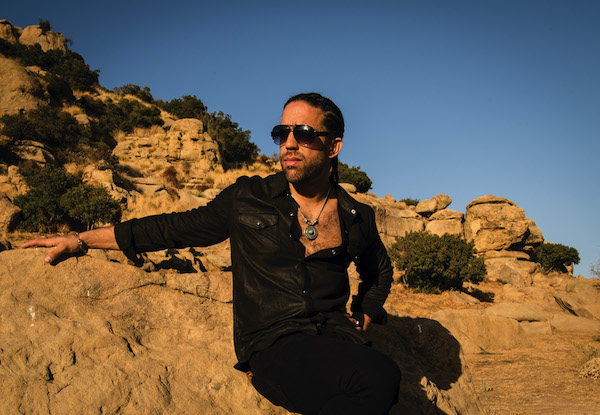Jan 13, 2026 2:09 PM
More Trump-Kennedy Center Cancellations
The fallout from the renaming of the John F. Kennedy Center for the Performing Arts to include President Donald…

Keyboardist Cameron Graves’ influences include Swedish metal band Meshuggah.
(Photo: Rob Shanahan)Answering the phone at his San Fernando Valley home, Cameron Graves apologized for not picking up the first time. “I was working out on piano,” he said. “You have to keep the chops up.”
Anyone who has heard Graves, whether with Kamasi Washington on The Epic, as a part of Stanley Clarke’s touring band or leading his own quintet, knows just how serious those chops are. His new album, Seven (Mack Avenue), is full of ferocious ostinatos, shimmering arpeggios and powerfully percussive left-hand lines.
Not only are the benefits of classical training evident, but there’s also the sort of shapeshifting virtuosity that comes with being equally fluent in jazz, rock and Indian music.
“I just have a wide variety of influences, man,” he said. “I got fanatically into tabla when I was like 19, 20 years old. And for about three years, I would practice tabla for like seven hours a day, every day.”
That, oddly enough, led him to metal, although that music isn’t often linked with the likes of Ali Akbar Khan or Zakir Hussain. But tabla drumming is built around complex polyrhythms, often played at fast tempos. Thanks to his knowledge of tabla, Graves said, “I could hear that in the music. Indian tabla rhythms and math metal and speed metal have a similar type of rhythmic structure.”
There’s also a parallel with Afro-Cuban music, which likewise is built around polyrhythmic cells. He pointed to the Swedish metal band Meshuggah as an example. “There’s a lot of 7 over 5, or 5 over 4, but in the Afro-Cuban way, where you don’t really hit the ‘1’ a lot, or you infer the ‘1,’” he explained. “A lot of thrash metal, and what they call ‘djent,’ took from that.”
Hence “thrash jazz,” the descriptor Graves devised for his own sound. “I wanted to write my favorite music, which is metal,” he said. “I wanted to figure out, how can I write this for piano?
“That’s when it came to me: Write a simple classical minuet. Because if you take the band away, it kind of sounds like that. The left hand has the accompaniment and the right hand has the melody. It’s is similar to Carl Czerny, or some of those short Chopin preludes.”
Graves’ band builds off that structure, with Max Gerl’s bass shadowing his left hand while guitarist Colin Cook alternates between right-hand melodic lines and unison riffing. On Seven, the band pivots between written and improvised sections, with the sound centered on piano.
“We’re rooted, we are in this rhythm,” Gerl said from Los Angeles, referring to composed sections. “But then it can be so fluid whenever [Graves is] venturing out. That very much stems from the influence of the group Meshuggah.”
Where Graves parts company with the Swedes, however, is distortion; Graves and Gerl keep their tone clean and crisp. “I think when it came time to do the mixing, they wanted the left hand and the grooves to be as smooth as possible,” Gerl said. “Take my word for it—it’s like putting your left hand in a blender, doing these lines that he comes up with on bass.” DB

Belá Fleck during an interview with Fredrika Whitfield on CNN.
Jan 13, 2026 2:09 PM
The fallout from the renaming of the John F. Kennedy Center for the Performing Arts to include President Donald…

Peplowski first came to prominence in legacy swing bands, including the final iteration of the Benny Goodman Orchestra, before beginning a solo career in the late 1980s.
Feb 3, 2026 12:10 AM
Ken Peplowski, a clarinetist and tenor saxophonist who straddled the worlds of traditional and modern jazz, died Feb. 2…

The success of Oregon’s first album, 1971’s Music Of Another Present Era, allowed Towner to establish a solo career.
Jan 19, 2026 5:02 PM
Ralph Towner, a guitarist and composer who blended multiple genres, including jazz — and throughout them all remained…

Rico’s Anti-Microbial Instrument Swab
Jan 19, 2026 2:48 PM
With this year’s NAMM Show right around the corner, we can look forward to plenty of new and innovative instruments…

Richie Beirach was particularly renowned for his approach to chromatic harmony, which he used to improvise reharmonizations of originals and standards.
Jan 27, 2026 11:19 AM
Richie Beirach, a pianist and composer who channeled a knowledge of modern classical music into his jazz practice,…